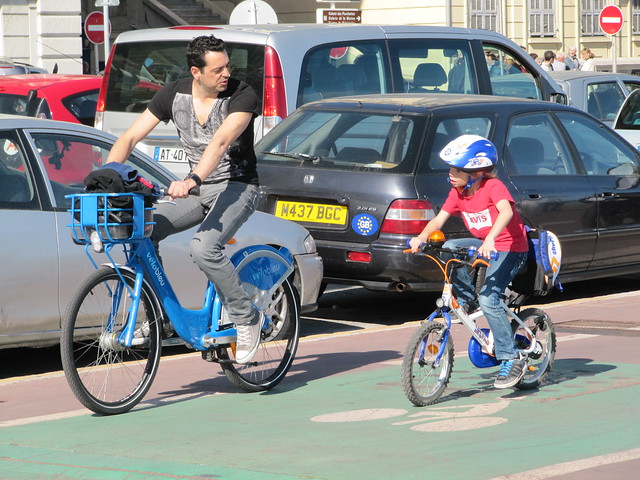As thought leaders from around the world gather for the London School of Economics' Electric City conference and ponder how technology is changing the places where we live, I thought I'd look at some of the emerging themes surrounding bicycles and digital technology.
Bike share and smart phones
It's no coincidence that public bike share systems and smart phones have risen to prominence at the same time. When it comes to tracking down an available bike or an empty docking station to park in, smart phone technology is helping to enable bike share systems from London to Guangzhou, to say nothing of having a handy pocket-sized GPS to help navigate these megacities.
VeloBleu bikes in Nice are locked and unlocked by smartphone
In Nice, France, the municipal bike share system is run entirely using mobile phones - each time you want to hire a bike you call a toll free number which tallies your phone number with your credit card, checks your credit and promptly gives you an access code for one of the distinctive blue bikes.
Closer to home there's a wealth of Apps available to users of London's Barclays Cycle Hire system helping users manage their accounts, find nearby bike hire stations and check the availability of bicycles to rent. It's clear that smart phones have taken all of the guess work out of bike share systems, helping to make them a more reliable and popular form of transport as a consequence.
Powered up!
In my recent trip to Taiwan I met with an innovative company who were creating a "bolt on" bicycle hub called the DS1-R. Instead of having to rebuild your wheel in order to install the hub, the chunky but sturdy looking casing sits on the outside of your rear wheel drop outs. Manufacturers Sun Up Eco Systems believe their hub beats all competition in terms of efficiency and can power your bicycle lights, charge your smart phone and run a GPS at the same time.
The bolt on Sun Up Eco hub - juicy!
As the company rep was keen to explain; "You don't even know you need all this power until you start using it, and then you can't do without it." Could a convergence in power generating bicycle hubs and modern technology help to keep technology running in the field for longer? Consider the use of bicycles in the aftermath of Hurricane Sandy in New York recently, or by reporters covering the Japanese Tsunami. Could power-generating bicycles help to keep the batteries charged on smart phones, brief case satellites and lap tops for relaying the news from these crisis zones, or to help co-ordinate emergency responses? The protesters at Occupy Wall Street used crude bicycle generators to help provide power to their encampment.
The Dash to Distraction
Of course it's not just cyclists using all of this new technology. As car dashboards look increasingly like the cockpit of a Saab fighter jet, more and more gadgets are competing for the scant attention of drivers. Essex Police recently caught a man driving his car at 56mph whilst operating an Apple iPad on his lap at the same time, and I've personally watched in disbelief as a Porsche driver rolled through the lights in Bishopsgate whilst emailing on his Blackberry. Westminster Council recently launched an App to help drivers find vacant "smart" parking space in a bid to cut congestion caused by people cruising for available spots, but failed to think through the implications of encouraging drivers to concentrate on data being shown on their telephone screens instead of the roads around them. If we are to pursue our current model of sharing the road we will, to quote Mayor of London Boris Johnson have to "keep our wits about us" in the future more than ever before.
Changing the world one bike and one smartphone at a time in emerging economies
Mobile phone based banking is much more prevalent in African countries than it is here in the UK. As smart phone technology came to the fore, online banking superseded the need to even construct High Street banks (or even High Streets, for that matter) in many places. Indeed, some 50% of Kenya's GDP will pass through mobile-based online banking next year according to Ken Banks, the founder of kiwanja.net and speaking at the Electric City conference.
The future of bike share? Prototypes for Copenhagen's shelved bike share system. (via Copenhagenize)
We all know how important bicycles are in places like Africa, where they can replace the need to spend hours carrying water with a shorter bicycle ride, or where goods can be brought to market more easily, thus helping to sustain local economies. But as people in emerging economies gain more access to simple and economical bolt-on bicycle generators such as the DS1-R, and smart phones become affordable for all, this could have a truly electrifying effect. Not only can a fisherman use his bicycle to get his produce to market, he can use his smart phone - being powered with juice generated by his bike - to ascertain the best price for his produce and even arrange an advance sale in order to reduce the amount of time spent at market meaning he can spend more time catching more fish, or with his family, or in further education.
The humble bicycle may not change so much over the years, but the combination of smart technology, free user-generated power and the bicycle itself could be a potent combination as we head to the future.
What about you? How do you use your smart phone to explore your city? How do you see these new technologies effecting the way you use your bike in the future?
The LSE Cities / Urban Age "Electric City" conference concludes on Friday 7th December - you can watch it streaming live online here.







6 comments:
I'm not sure about me, I have little interest in smartphones or iPads, but I read an article on the on-line version of one of the national newspapers only the other day, reflecting on "peak car" and the impact of the iPad, smartphones and social media on young peoples' attitudes to the car and to transport.
The effects are varied but all push in one direction: the ability to communicate with friends via Facebook etc removes some of the need to make a physical journey to meet friends so young people travel less; the ability to work or read or view films and download material in real time makes public transport more attractive for longer journeys, especially business trips - you can't work on your laptop and drive at the same time but you can on the train; on-line shopping has finally taken off - I can remember about 10-12 years ago there was a lot of hype about the online retail revolution, and at the time the hype proved premature, but not now.
For many younger people, particularly urban dwellers, the car has become something of an irrelevance, with driving licence possession down a third among 17-25 year olds, and an observable "surf wave" effect, as advancing age does not mean transitioning to the habits of your elders, but pushing the age boundaries of your own value out further. Driving is steadily becoming a preoccupation of middle aged and older people, and eventually those older people have to stop because they are simply not safe behind the wheel anymore. Car companies, like Big Tobacco, will no longer be able to rely on recruiting young people to replace the ones who die out.
That doesn't mean of course that everyone is jumping onto bikes. So far, they aren't, relying instead on tube and bus. It also isn't universal - if you live in the countryside then young people are still keen to get their driving licences because often personal freedom still depends on the car in a world without bus services and distances or terrain which discourage cycling. The tyranny of the car and its burden on the disposable incomes of poorer people is not over yet.
Once people cotton on to the concept of the e-bike - tax, licence and insurance free provided that the motor is no more than 200 watts, assisted speed limit is 16mph (?) and the motor contributes to, rather than replaces the rider's leg effort - surely many of the geographical barriers of distance or hilliness will fall away.
All we need now is somewhere decent to cycle.
Paul your comments is wise, insightful and welcome as ever - you always make such an interesting contrbution to these articles and I really appreciate it. Thank you for taking the time.
The issue of young people driving less is a really intersting one and I certainly hope that some academics somewhere are monitoring this emerging trend. I recently saw an advertisement from overseas for a city bus service whereby the buses had been installed with wifi and journeys onboard were being touted as "sharing time" - that is to say an opportunity to game, use social media, catch up on emails or work whilst moving along. Who wants to be stuck in traffic driving with nothing else to do? I believe we will see more and more thinking along these lines, especially as tablet computers become more prevalent. Could wifi connected buses and trains become the biggest competition for bicycles I wonder?
If your cell network hubs are flooded, you can generate as much power for your phone as you will. You will get no connection.
And I don't know, whether the network hubs can be powered by bicycle - or whether the phone company would let you ...
These bikes look interesting. In my opinion, traditional bikes are still better. One purpose of biking is to give riders the chance to be fit and enjoy the sceneries they'll pass by. But if you have these gadgets on, you'll get distracted and won't have as much fun biking around.
Everything fine except the penalty!..If you don't return your bike, or you bring it back late or damaged, you may be charged up to £300.
For many younger people, particularly urban dwellers, the car has become something of an irrelevance, with driving licence possession down a third among 17-25 year olds, and an observable "surf wave" effect, as advancing age does not mean transitioning to the habits of your elders, but pushing the age boundaries of your own value out further. Driving is steadily becoming a preoccupation of middle aged and older people, and eventually those older people have to stop because they are simply not safe behind the wheel anymore. Car companies, like Big Tobacco, will no longer be able to rely on recruiting young people to replace the ones who die out.https://www.sztigerwong.com
Post a Comment